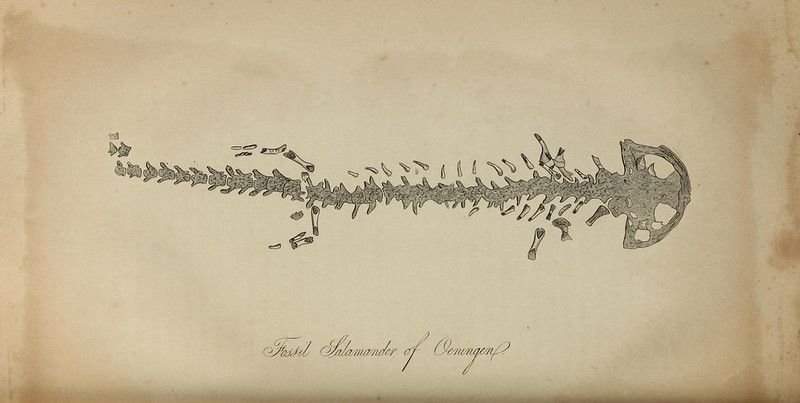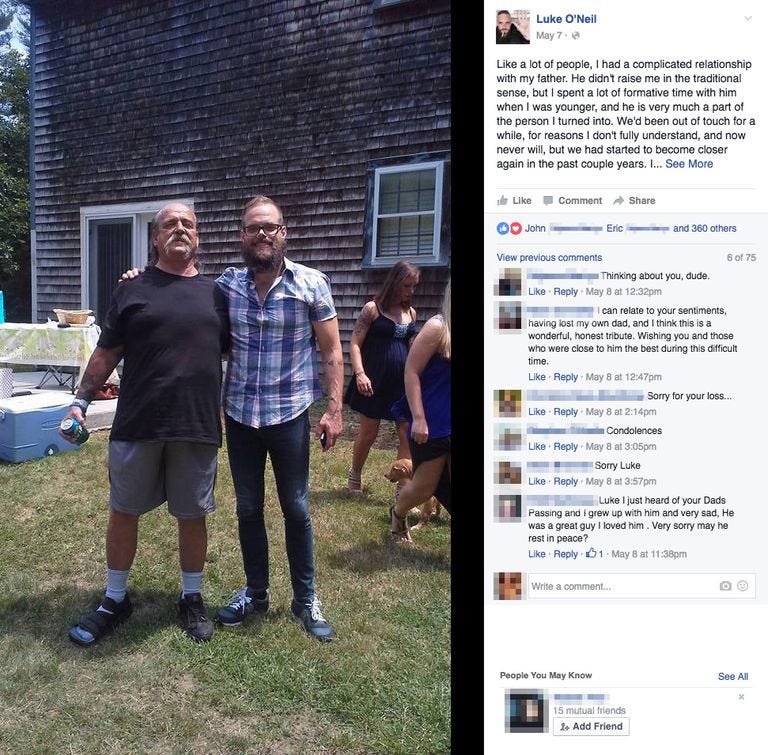I'd been expecting him to die for so many years

This essay appears in my book Welcome to Hell World. It was originally published in Esquire.
The fifth time I went to watch my father die was the one that finally took.
He'd been in and out of hospitals, and hospice, and nursing homes for so many years. He'd clawed his way out of so many comas. We all assumed up until the final moments that this time would be no different. In fact, I still half-expect to get a phone call from him today, his tobacco-ravaged voice asking me to call him back, like so many of the voicemails he left me over the past year or two. He was only 61, but a lifetime of dogged, determined substance abuse and enough related ailments had finally conspired to finish the job he had started at a young age.
When I found out he had finally passed, I was driving, on my way from Boston to Foxwoods. We had been at his bedside all day, back and forth to the hospital all week. My siblings and I—a cabal of half-, step-, and adopted-then-re-found sisters that you'd need one of those charts in the back of a Russian novel to understand—had made the life-changing decision to kill him. At least, that's how it felt.
Of course, as the doctors at Mass General Hospital explained, we weren't actively doing anything to end his life. We were simply allowing nature to take its course, to remove him from the H.R. Gigerian exoskeleton of machines and tubes that allowed him to breathe, lowered his critical blood pressure, and provided him with the barest of sustenance, a thin gruel of intravenous sugar water.
How do you explain that to a Facebook friend?
Earlier this year, Facebook rolled out a new feature called Reactions. While the long-speculated "Dislike" button didn't make it in with "Like," "Love," "Haha," "Wow," "Sad," and "Angry"—a sort of Kübler-Ross model of casual impulse emotion—one of the prime motivations for the additions, it seems, was to include a way for users to "sympathize" with one another. The limited, emotional-homogenizing parameters of the "Like" button are something most of us have come across when a friend shares news of a breakup, a lost job, or any other number of Significant Life Events. The death of a loved one, for instance.
My wife and I had planned an overnight to the casino resort in Connecticut several months back, and were informed there was no telling how long it might take for my dad to go. It could be hours, it could be days. In truth, the thought of watching his last rasping gasps was too horrible for me to consider. The resort was an appropriately absurd place to be, given the circumstances: the oppressive, relentless din of the slot machines, the haggard demeanor of the assorted walking dead that populate most casinos, the artificial feel of every detail, down to the light quality and the elevated oxygen levels. If a casino is a place where the living go to deaden themselves with indulgence, what better place for the living to figure how to feel about the dead?
To be sure, that's not something I was in any shape to discern then, or even now, a couple of weeks later.
My father did not raise me.
That job was undertaken by an amazing man, my step-father, and my loving mother. My father was not a significant part of most of my adult life, until recently, when we'd started to reconnect. Much of that, I suspect, was because he was fearful about reaching the end without a relationship with his various children from three different wives. He was, like many fathers before him, and many surely to come, abusive to my mother, something that, once I learned about it as a young man, caused me to cut him out of my life for a long time, and something that is near impossible for me to forgive even now.
But there's something about death and dying that lets us overlook past sins, and he was always good to my sisters and I when we visited as children and teenagers. He seems to have been a good father to my half-sister, some 17 years younger than me. I would never have forgiven myself if I didn't get to know him at least a little bit once again before he was gone.
I'd been expecting him to die for so many years, that at some point the thought of how to openly talk about his death overtook my thoughts of his actual departure from this earth. Perhaps that's the writerly instinct kicking in. Even in the midst of the most harrowing of life events, you can't help but pause to notice a detail and think where it would fit in the story.
As a group of us watched him slip away, we poked and prodded at his tattoos, still just-visible on his arms, enlarged and bloated from so many tubes, now bruised and blood-red. There was my mother's name, long since covered up by a black panther; his most recent ex-wife's name; a naked Porky Pig, dick and balls and all; a devil with its tongue sticking out, straddled by a naked woman; and other assorted tattoos one apparently picks up along the way in various motorcycle gangs and clubs.
They say tattoos tell the story of someone's life, and in staring at his, we actually began to tell it to each other, this assembled group of family and friends. It was cathartic in the way speaking of the dead can be, although macabre at the same time, as he wasn't even dead yet. I couldn't help but be taken aback by the existential horror of being vaguely conscious, unable to move or talk, while everyone you know is standing around your body crying. Ah shit, you'd probably think. I must be really fucked this time.
Still, I found comfort in hearing stories from the parts of his life I wasn't there for, many of which you might rightfully consider sad. But given the bastard's charisma, they now took on a softened edge in the transubstantiation of an addict's antics into black comedy.
How do you translate that into a status update?
Should you?
For much of those first 24 hours after he died, I wrestled with that question. It was something I'd thought I had been prepared for for years. But faced with the prospect, I found myself shrinking from the pressure. As someone who pours most of the details of his life out online, both as a writer and as a social media addict, I found myself torn by two opposing motivations.
On one hand, everything we do has become grist for the content mill, and people seem to think nothing of posting the most intimate details of their lives, successes, losses, and failures on Facebook, Twitter, Instagram, and elsewhere. But the idea of inserting the passing of a man's life—especially one as messy as his—felt somehow diminishing.
There goes the news of a man's death, sandwiched between a deluge of memes, cranky political rants, and hyper-ventilating over the latest trending topic from the celebrity industrial complex. And yet, not saying something seemed like a violation as well. There's a reason why we still run obituaries in newspapers, for even the most average among us, because to note the ending of a life is to remind us all of the most important thing that binds us together as people, as communities, as a civilization. To point out that someone died is to point out that they lived at all.
And so I posted the fucking thing on Facebook.
It felt somehow both celebratory and an immediate failure, as if this most private of emotions was Hoovered out of me by the unquenchable hunger of the marrow-sucking content beast. Post something for the likes. Test out that new reaction feature.
I wrote:
Like a lot of people, I had a complicated relationship with my father. He didn't raise me in the traditional sense, but I spent a lot of formative time with him when I was younger, and he is very much a part of the person I turned into. We'd been out of touch for a while, for reasons I don't fully understand, and now never will, but we had started to become closer again in the past couple years. I am grateful that I got to see him a few times this year and hear more about him as a man. He wasn't perfect, but which of us is? And in recent years he raised a fine young woman, and was a good father to her. I'm not sharing this here because I want sympathy from any of you, in fact I'd rather those of you I don't know very well don't say anything. I am simply writing to announce the passing of a life, the life of Edward Grenham. He will not soon be forgotten. He was always proud of me, in whatever minor successes I have had along the way, and that made me happy to have been able to do that for him. Among other things, I owe him my good looks, and, unfortunately, my hairline. I would often grumble about how often he would call on the phone so much of late, but I would love to hear his voice again. Thank you for recognizing his life in whatever way you see fit.
The post pulled in 362 reactions: 323 likes and 39 hearts. It got shared two times, by my sisters. There were 75 comments. Not bad in terms of engagement, right? That's how we measure everything important these days, right?
Dutifully, friends and near-friends and who-the-hell-are-yous commented to show their sympathy, despite my specifically asking people not to. I had pictured myself becoming enraged at the mealy-mouthed, half-hearted "our thoughts are with you" and "thinking of you" posts—the same empty dreck you get on your timeline every year on your birthday from people who you haven't heard from since your last birthday. But to my surprise, their sympathy, earnest or not, was a sort of salve that hit its mark. There also were genuinely heartfelt notes from people. Why did I expect that notion to be the exception to the rule?

What they really want is the ability to express empathy; not every moment is a good moment," Mark Zuckerberg said last year.
Empathy and sympathy are two different things of course, although it's not surprising that Zuckerberg would mistake the two. No one will ever fully understand how you feel when someone dies, but sympathy isn't supposed to be understanding. When you sympathize, you're not feeling another's feelings as your own—that's empathy. You're simply recognizing that their feelings exist.
What more could you expect of a Facebook friend?
Facebook is an undeniable ill for many reasons, and a boon for countless others, but it's also an extremely efficient tool for the doling out of such sympathy. Without Facebook, a few hundred people would never have known of the passing, or the life, of a man, regardless of how flawed that man was.
If getting people to stop for a moment, to reflect—even in the brief time span that it takes to toggle between "Like" and "Sad" and "Love"—on a human life is the end result, I'll take it.
It's not much, but most of our lives aren't either. In spite of everything, we're trying to connect with those who have hurt us. We're trying to make sense of it, and the tools aren't perfect, but we're trying.
